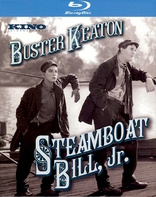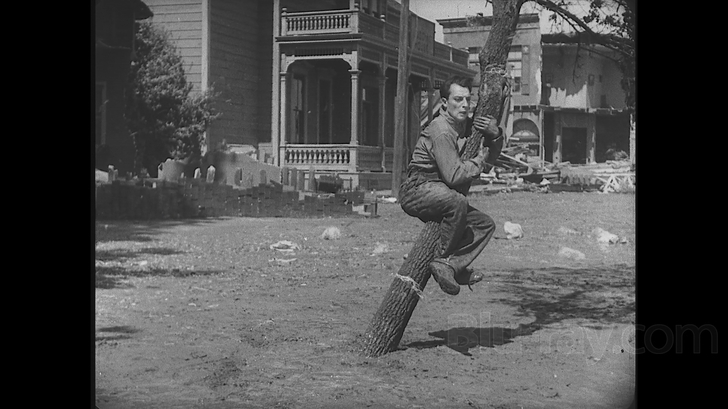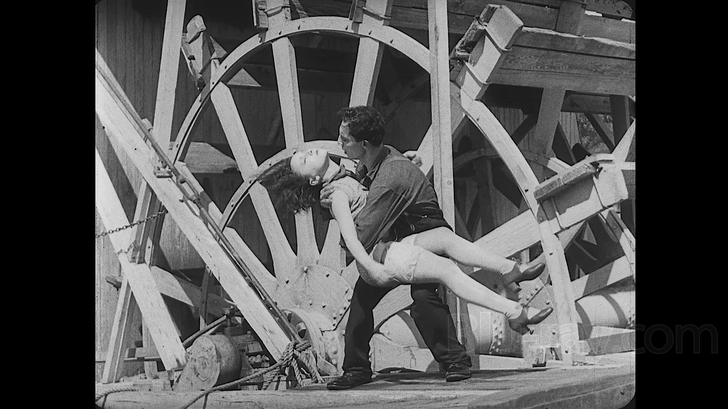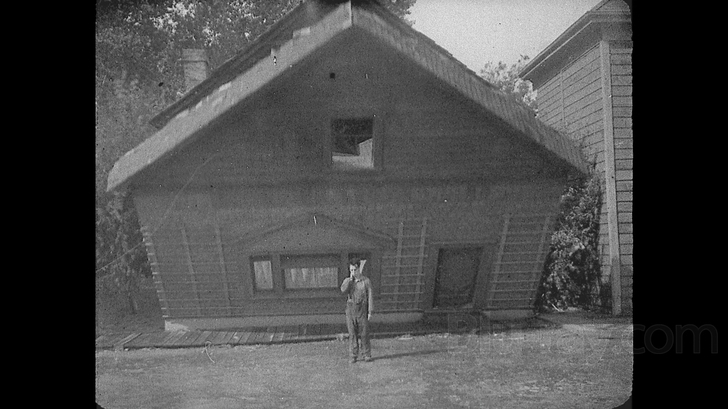Steamboat Bill, Jr. Blu-ray Movie
HomeSteamboat Bill, Jr. Blu-ray Movie 
Kino Lorber | 1928 | 71 min | Not rated | Jul 06, 2010
Movie rating
8 | / 10 |
Blu-ray rating
| Users | 4.7 | |
| Reviewer | 4.5 | |
| Overall | 4.5 |
Overview
Steamboat Bill, Jr. (1928)
The mild-mannered son of a steamboat captain caught in the middle of the bitter rivalry between his father and another Mississippi riverboat owner.
Starring: Buster Keaton, Tom McGuire, Ernest Torrence, Tom Lewis (I), Marion ByronDirector: Charles Reisner, Buster Keaton
| Drama | Uncertain |
| Romance | Uncertain |
| Comedy | Uncertain |
| Family | Uncertain |
| Action | Uncertain |
Specifications
Video
Video codec: MPEG-4 AVC
Video resolution: 1080p
Aspect ratio: 1.32:1
Original aspect ratio: 1.33:1
Audio
Music: DTS-HD Master Audio 5.1
Music: Dolby Digital 2.0
Music: Dolby Digital 2.0 Mono
Subtitles
None
Discs
50GB Blu-ray Disc
Single disc (1 BD)
Playback
Region free
Review
Rating summary
| Movie | 5.0 | |
| Video | 4.0 | |
| Audio | 4.0 | |
| Extras | 3.0 | |
| Overall | 4.5 |
Steamboat Bill, Jr. Blu-ray Movie Review
Kino International brings another Keaton classic to Blu-ray.
Reviewed by Casey Broadwater July 11, 2010I wish I could say that physical, visual comedy has come a long way since Buster Keaton pratfell across the screen in a series of silent comic classics in the 1920s, but it’s just not true. Sure, the “gags” have gotten bigger—often assisted by CGI, harnesses, and stunt doubles—but few comedians have been able to match Keaton’s graceful, exacting clumsiness, or his ability to communicate subtleties of emotion solely through body language. (Jaques Tati, with his Monsieur Hulot character, comes closest, I think.) His method of acting—deadpan and deliberate, void of sentiment but full of feeling—is a lost art that faded out with advent of “talkies.” Keaton himself faded as well. After a decade of almost complete creative control—a freedom that produced Our Hospitality, Sherlock, Jr., and The General, among others—Keaton signed on with MGM in 1928, giving up his independent status and becoming just another asset in the studio’s ledger book. His last production as an independent filmmaker was Steamboat Bill, Jr., and if not his best film—it’s hard to single one out—it’s arguably the most iconic. Kino International, currently the leader in bringing silent movies to Blu-ray, has certainly done Steamboat Bill justice, restoring it from the best available source elements, and including two slightly different cuts of the film.

Steamboat Bill, Jr., early treehugger...
Keaton’s previous film, The General, set during the Civil War, is an elliptically structured comedy about a stolen locomotive that—in one of the most expensive stunts of the silent era— ends up crashing into a river. Substitute a steamboat for the train, and a massive hurricane for the climactic crash, and you get—on the surface, at least—Steamboat Bill, Jr. The thematic innards of the two films, though, are quite different, as Steamboat Bill, along with a typical Romeo and Juliet-type romance angle, also tells an acutely insightful story about the inherent awkwardness of father/son relationships.
William “Steamboat Bill” Canfield Sr. (Ernest Torrence), a salty old codger, is the captain of The Stonewall Jackson, a nearly derelict steamer that’s seen much better days. When he gets a telegram announcing that his college-aged son, Bill Jr. (Keaton), is coming to visit—he hasn’t seen him for years—he expects to see a strong, blue-collar sort who will effortlessly follow in his footsteps. Instead, Junior is the polar opposite of his work-hardened father. When he shows up at the train station, looking like a collegiate dandy—wearing baggy pants and a beret, sporting a pencil-thin mustache and carrying a tiny guitar—Bill Sr. is taken aback, and more than a little embarrassed. His reputation in town has already been diminished, since his business of late has been poached by the wealthy John King (Tom McQuire), who has opened a “floating palace” that bests the Stonewall Jackson in every way. It should go without saying that King has a daughter, Kitty (Marion Byron), who has a thing for Bill Jr.
The comedy in the first half of the film hinges on the discomfiture between father and son, a theme as universal as love or death. Most of the gags involve Bill Sr. trying to de-city-fy his son’s foppish image, like when he tells a barber to “take that barnacle off his lip”—refering to Junior’s Errol Flynn mustache—or when they go to a haberdasher to replace Junior’s beret with more respectable headwear. One of the greatest comic moments in the film is actually quite subtle. Bill Sr. sends his son into a tailor’s shop to get outfitted to work on the steamer, and Kitty comes along to give her opinion. An intertitle reading “Working clothes for the boat—with her help” appears, and when we next see Junior he’s attired in the most regal-looking captain’s costume imaginable. As Junior walks down the dock, Bill Sr. and his first mate look on in palpable disgust. The first mate casually hands Bill a pistol and next title card pops up: “A jury would never convict you.” It’s a joke that would still work well today.
The painfully uncomfortable father/son relationship is played for laughs, but there’s an undercurrent of emotional honesty that gives the film unexpected tenderness. In one scene, Bill Sr. gives Junior a wad of cash and a train ticket, and instructs him to leave in the morning. Later, Junior sneaks into his father’s room, puts the money on a table—as if to say he doesn’t need it— and then turns to leave. In a brilliant moment, he rethinks, palms the cash, and puts it in his pocket again. There’s so much quiet feeling in this sequence, and it’s all told visually.
The subtlety of the first half gives way to a last act that’s as chaotic as it is comedic. A hurricane descends upon the town, wreaking destruction and putting the lives of Bill Sr., Kitty, and John King in peril. The practical effects here are—even now, 80 years later—almost unbelievably impressive, from the wind that blows cars backwards and keeps Keaton aloft as he clings to a small tree, to buildings that collapse, fly through the air, and slide into the river. The scale is immense, and Keaton uses the natural disaster as a stage for some of the best acrobatic gags of his career, including his most iconic and death-defying stunt—standing beneath a two-ton wall as it falls over, the presence of a tiny, frame-fitting window the only thing that keeps Keaton from being squashed like a bug. (Even if you haven’t seen this particular stunt, you’ve probably seen it parodied in everything from MacGuyver to Arrested Development.) I could go on and on about Steamboat Bill, Jr.—it’s one of my favorite silent comedies—but reading about the film is no substitute for the experience of watching it. Silent film cineastes already know this is a must- watch, must-own title, and for newcomers to Keaton’s work, Steamboat Bill Jr. is as perfect a place as any to start.
Steamboat Bill, Jr. Blu-ray Movie, Video Quality 

Of the silent films that have made the high definition leap to Blu-ray thus far, City Girl—
released by U.K. imprint Masters of Cinema—definitely looks the best. Kino's treatment of Keaton's
The General runs a close second, Battleship Potemkin a respectable third, and
Steamboat Bill, Jr. chugs in at fourth. (I've yet to see Sunrise on Blu-ray, which
may jostle my rankings.) The beautiful thing is, they all look absolutely astounding for 80+ year-old
films, especially given all of the frankly horrible public domain home video editions we've seen over
the years. Plus, since they've all been stored under different conditions, have all aged in different
ways, and have prints in varying states of fidelity, it's not really fair to compare. What we can look
at, however, is how faithful and accurate the studios' restorations have been. Thankfully, Kino and
Masters of Cinema have both expressed their desire to release these silent classics with no
unnecessary digital tampering, to present the purest visions of the films presently
possible.
As with The General and Battleship Potemkin, Kino has given Steamboat Bill,
Jr. a miraculous transformation that easily bests any previous home video version of the film.
There's an understandable amount of damage to the print—white flecks, vertical scratches,
occasional tears, some shakiness—but for its age, the film is in remarkable condition. Clarity is often
revelatory, letting us make out extremely fine detail, like the texture of the leather on Bill Jr.'s
luggage tag, or the weft of the elder Bill's work shirt. Unfortunately, some of the hard lines do look
overly edgy, with black haloing present around some foreground objects/people. Kino has
categorically denounced using edge enhancement, so I can only speculate that this has something
to do with the Blu-ray compression/mastering process. I will say this, though: the effect is much less
apparent in motion than it is on some of the screenshots, where it looks very pronounced. This will
be a matter of personal preference and, to some extent, the size of your screen, but it really wasn't
much of a distraction for me. A bigger issue—but once again, no deal breaker—is that the gradation
seems slightly off at times. During a few of the outdoor scenes, highlights can appear too bright, and
black levels—throughout—are never as dense as they could be. Consequently, the image can't quite
achieve the depth or presence you can see in City Girl and The General. Still, I was
frequently in awe of the picture, which is surprisingly detailed and rich with natural, untouched
grain. It's easy to get into full-on nitpick mode about these transfers, but Kino really has done a
fantastic job here.
Steamboat Bill, Jr. Blu-ray Movie, Audio Quality 

For the feature presentation of Steamboat Bill, Jr., Kino has given us three audio options. The default track is a DTS-HD Master Audio 5.1 surround mix featuring new music by The Biograph Players. Doing a new score for a silent film is a tricky proposition—I always cringe when I see the "metal" version of Nosferatu—but the Biograph Players have pulled this one off. Obviously, the music sounds newly recorded—the mix is bright and clean, with ample bass response—but the score itself is appropriately old-timey, with a bit of Dixieland swing and occasional sound effects that accompany the on-screen action. My only complaint here—and it's a minor one, purely preference—is that, volume- wise, the music seems to be coming from all channels equally. If your rear speakers are closer to your sitting position than your front line-up is, you might find the music a bit loud in the back of the soundfield. If so, you could always switch to the Dolby Digital 2.0 version of the score, which sounds perfectly fine for a lossy mix. The final option is an excellent vintage organ score by Lee Erwin, presented as a Dolby Digital mono track. The sole audio option for the "Killian" version of the film— presented under the "Extras" tab—is a Dolby Digital 2.0 piano-centric score by William Perry.
Steamboat Bill, Jr. Blu-ray Movie, Special Features and Extras 

Steamboat Bill, Jr. - Killiam Version
During the silent era, it was common to create a second cut of the film—often intended for
international markets—out of alternate takes and camera angles. This so-called "Killiam Version" is
just that, and it's definitely worth watching, as there are some subtle differences in Keaton's
performance. Comprised of completely separate film elements from the "Keaton Estate Version," the
Killiam cut is slightly softer, with more judder and brightness flickering. In some ways, though, it
almost looks better than the featured "Estate" cut, as the haloing is absent and the highlights seem
softer. Whatever your preference, kudos to Kino for including both versions.
Visual Essay (720p, 12:20)
A documentary on the making of Steamboat Bill, Jr., featuring a comparison between the
two versions of the film.
Steamboat Bill: The Song
Two versions of the folk song that inspired Steamboat Bill, Jr., by Edward Meeker (2:10) and
Irving Kaufman (2:48).
Why They Call Him Buster (1080p, 1:11)
A montage of pratfalls and stunts taken from various Keaton features and shorts, intended as a
promo for Kino's Lost Keaton collection.
Stills Gallery
A user-directed gallery containing 69 stills.
Steamboat Bill, Jr. Blu-ray Movie, Overall Score and Recommendation 

Steamboat Bill, Jr., as Buster Keaton's last independent film before joining MGM's stable of directors and having his creative freedom restricted, was the end of an era for the stone-faced comedian. It's also one of his best films, filled with manic energy, a simple but tender story, and stunts that, for their time, seemed absolutely insane. Actually, they still seem insane. As with The General and Battleship Potemkin, Kino International has done a swell job with this release, and—video nitpicks aside—there's really no reason for silent film fans to avoid adding this comic masterpiece to their collections. Futhermore, if you've never had a proper introduction to Keaton or silent films in general, Steamboat Bill, Jr. is a fantastic place to start. Highly recommended.
Other editions
Steamboat Bill, Jr.: Other Editions
Similar titles
Similar titles you might also like

The General
1926

Sherlock Jr.
1924

Our Hospitality
Remastered
1923

Seven Chances
1925

The Navigator
1924

The Kid Brother
1927

The Kid
1972 Rerelease Version
1921

Buster Keaton: The Short Films Collection
One Week / Convict 13 / Neighbors / The Scarecrow / The Haunted House / Hard Luck / The High Sign / The Goat / The Play House [Playhouse] / The Boat / The Paleface / Cops / My Wife's Relations / The Frozen North / The Electric House / Day Dreams [Daydreams] / The Balloonatic / The Love Nest
1920-1923

Will Success Spoil Rock Hunter?
Limited Edition to 3000
1957

College
1927

A Lesson in Love
En lektion i kärlek
1954

City Lights
1931

Sullivan's Travels
1941

Limelight
1952

The Poor Little Rich Girl
1917

Lonesome
1928

His Girl Friday 4K
includes "The Front Page" (1931) on BD
1931-1940

The Gold Rush
1925 and 1942 Versions
1925

City Girl
1930

Variety Lights
Luci del varietà
1950
